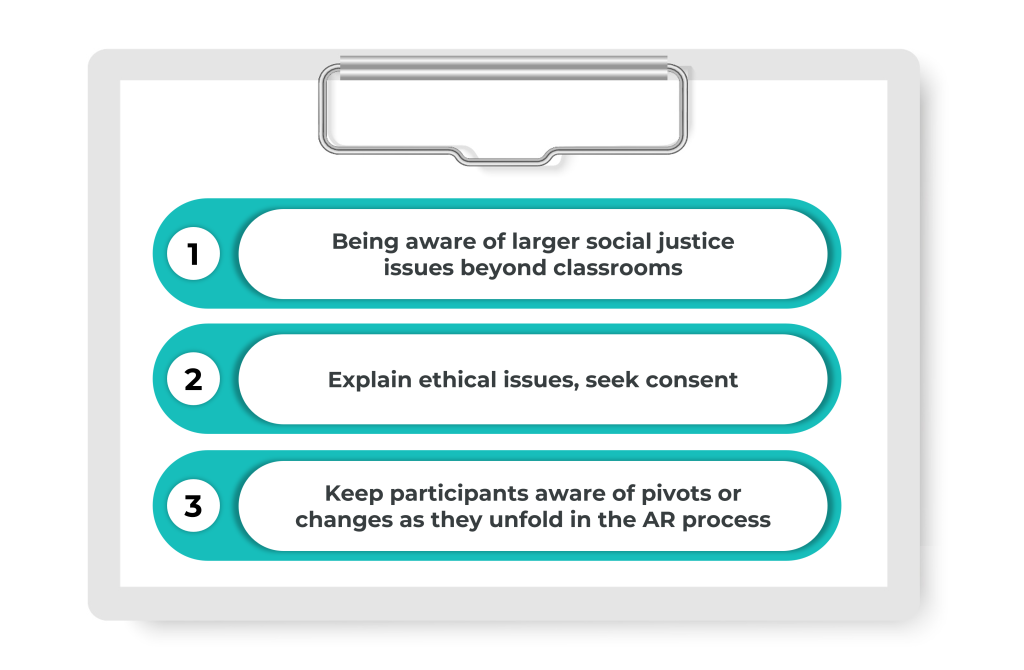Historically, individuals engaging in academic educational research, including higher education faculty and others involved in educational research, have been bound by ethical guidelines that protect the rights of human subjects/participants.
Ethical guidelines are there to ensure that participants are not harmed or deceived, that they have been informed regarding what participation entails, that they have agreed to participate, and that they have been assured that the confidentiality of their responses and their participation will be maintained.
(Hendricks 2013)
Suggested Guidelines for Respectful Action Research Practice
Several suggestions have been put forth regarding ethical guidelines for action research Zeni (2009), including:

Image Description
- Being aware of larger social justice issues beyond classrooms
- Explain ethical issues, seek consent
- Keep participants aware of pivots or changes as they unfold in the AR process
However, procedural guidelines for conducting ethical action research have not yet been agreed upon by the professional community. So guidelines for outsider educational research must be observed.
In essence, researcher-practitioners must apply standard research ethics guidelines to their pedagogical, recruitment, data collection, and data reporting strategies.
Does my Action Research Study Require Ethics Board Approval?
Expedited Review / Waiver
In action research projects, often there’s no need for institutional ethics board approval.
- Action research aims to improve workplace conditions, focusing on bettering the experience of students, clients, or patients. Unlike traditional research, which involves rigorous participant recruitment and ethical scrutiny, action research typically undergoes a simpler process.
- Studies aimed at enhancing program or course quality usually do not require approval from an institution’s research ethics board. These practitioner-led studies often qualify for exempt or expedited review, categorized as Quality Improvement.
- This is because they rely on standard educational practices that don’t disadvantage any group or harm participants.
Systematic Processes of Inquiry
- When practitioners involve students in routine inquiry activities as part of their regular interactions, formal consent is typically not necessary.
- This is because these systematic inquiry processes fall under the professional duty of care, which is legally recognized and doesn’t require additional formal legitimization procedures.
Publication and Sharing
- When deciding on the need for formal permission for action research, consider your audience. If the research is only for you and your school’s teachers, formal permission for data collection might not be needed.
- This data, used for diagnostic purposes, is part of routine teaching decisions. However, if you plan to present your findings to a broader audience beyond your school, including professional journals, conferences, or community presentations, you must obtain permission to use student work samples, quotes, or observation notes.
- The primary purpose of this permission is to safeguard student privacy. (Mertler 2020)
There are a number of ethical issues you must consider when planning or designing your research project.
These issues are:
- Informed consent
- Privacy
- Confidentiality
- Anonymity
- Risk
- Harm
- Deception
- Exploitation
We will also review a few other ethical issues that you should be aware of when undertaking research, specifically the responsibility to be mindful and ensure the accuracy of your research.
Remember: Instructional Practice
- Standard evaluations by professors on their teaching methods typically do not require ethics approval.
- Ethics approval is necessary when an assessment aims to contribute to general knowledge, or results are intended for publication or presentation externally.
- Particularly critical in scenarios with a power imbalance, such as between students and faculty conducting research.
- Some institutions may allow an expedited ethics review or require a Quality Improvement form submission in these cases.
- Participants must be informed about data collection and analysis processes, with the option to opt-out provided.
- Action research emphasizes the importance of transparency and informed consent, ensuring all involved are aware and agree to the study’s procedures.
Interactive Book
Principles of Research Ethics
Click on the previous/next buttons to move between pages.
Additional Resources
Ethics is Not Optional:
- Kwiatkowski, Richard. “60 seconds with Dr Richard Kwiatkowski – Research Ethics.” YouTube, 17 Jan 2013.
- Minute of Medicine For Your Mind. “EDU671 Fundamentals of Educational Research – 3 Concerns of Ethics in Educational Research.” YouTube, 10 Oct 2014.

